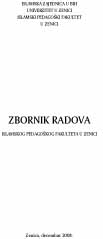SINTAKSIČKE OSOBENOSTI PREDIKATA IMENSKE REČENICE U KNJIŽEVNOM ARAPSKOM JEZIKU
SYNTACTIC FEATURES OF THE PREDICATE IN THE NOMINAL SENTENCE IN LITERARY ARABIC LANGUAGE
Author(s): Mejra SoftićSubject(s): Education
Published by: Islamski pedagoški fakultet Univerziteta u Zenici
Keywords: predicate category; syntax; predicate; nominal sentence; formal-syntactic parameters; structural-morphological differentiation; nominal word; syntactic position; elision; semantic relations.
Summary/Abstract: As a basic element of grammatical predicate category, the nominal sentence predicate in literary arabic language is specified by important structural, morphological and syntactict features. These faetures result from traditional rules deep rooted in arabic syntax, according to them the arabic grammarians in their general sentence classification into nominal and verbal one, do not consider lexical meaning of predicate that defines the declarative caracter of sentence. In this view, the formal-syntactic parameters are the basic modifiers and according to them, the sort of word that stands in the beginning of sentence is followed and analyzed and, depending of its lexical nature, the sentence is named as a nominal or verbal. The parameters of sentence classification like these provide structural and morpfological differencies to the predicate of nominal sentence, so it appears in the form on an individual underived or verbal derived nouns, nominal or verbal sentence and in the form of proposal or adverbial syntagm. Each of these predicate appearing models has it own features that are important for correct interpretation and understanding of nominal sentence. The syntactic position of nominal sentence predicate is conditioned by some defined syntactic-formal limitation of subject or predicate and in relation to its subject, the position of predicate can be obliged normal or obliged inverse. The elision of nominal sentence predicate can be allowed and obliged, and it is caused by contextual-formal surrounding. According to attitudes of arabic grammarians, the use of conjuction between two or more predicates is not arbitrary but depends on sort of their semantic relations and can be allowed, prohibited or obliged. By some special contextual surruondings, the use of conjuction "fa" in front of predicate of nominal sentence is allowed and it is understood as a formal indicator of predicate position or as a kind of corroboration of subjectiv – predicate relation.
Journal: Zbornik radova Islamskog pedagoškog fakulteta u Zenici
- Issue Year: 2008
- Issue No: 06
- Page Range: 171-193
- Page Count: 23
- Language: Bosnian

